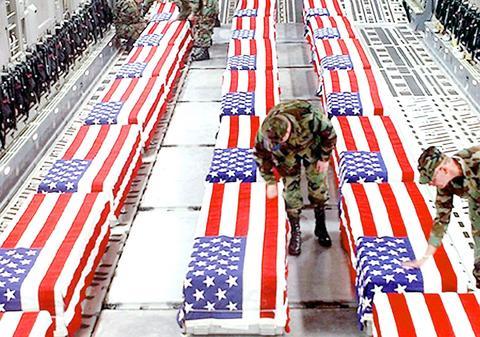The Bush administration's policy of barring news photographs of the flag-covered coffins of service members killed in Iraq won the backing of the Republican-controlled Senate on Monday when lawmakers defeated a Democratic measure to instruct the Pentagon to allow pictures.
The 54-39 vote came after little formal debate, with seven Democrats joining 47 Republicans to defeat the provision.

PHOTO: EPA
Two Republicans, senators Olympia J. Snowe of Maine and John McCain of Arizona, voted in favor of letting news photographers have access to Dover Air Force Base in Delaware, where coffins containing the war dead from Iraq arrive.
"These caskets that arrive at Dover are not named; we just see them," said McCain, a former Navy pilot who was a prisoner of war for five years in Vietnam. He added, "I think we ought to know the casualties of war."
But President Bush has insisted that the policy banning the photography protects the privacy of the families of the dead, a view reiterated by lawmakers who opposed the measure.
Some Republicans, including Senator Charles E. Grassley of Iowa, complained that Democrats were trying to score election-year points with the effort. Grassley noted that the policy had been in place since the first Bush administration, in 1991. "This policy has been in place for 13 years," he said. "Nobody has raised a complaint about it until now."
But the policy has not been consistently followed; President Bill Clinton took part in numerous ceremonies honoring dead servicemen. In March 2003, just as the US embarked on its war with Iraq, the Pentagon issued a directive stating that there would be no news coverage of "deceased military personnel returning to or departing from" air bases.
The measure defeated on Monday was proposed by Senator Frank R. Lautenberg of New Jersey, as an amendment to a US$447.2 billion Pentagon spending plan for 2005 now under consideration in the Senate. Lawmakers hope to finish work on the bill on Tuesday.
Lautenberg's amendment would have instructed the Department of Defense to work out a new protocol letting the news media cover the arrival of the war dead in a manner that protected families' privacy.
"A majority of the Senate are now working on behalf of the president to conceal from the American people the true costs of this war," Lautenberg said in a statement after the vote. He said his amendment "would bring an end to the shroud of secrecy cloaking the hard, difficult truth about war and the sacrifices of our soldiers."
The issue of pictures of the war dead has been a delicate one for the administration in recent months. In April, a collection of more than 300 images of coffins landing at Dover were made available after a Web site, www.thememoryhole.org, filed a Freedom of Information Act request for any pictures of coffins arriving at Dover from Iraq.
The images were taken by Air Force photographers and released by the Air Force Mobility Command. The Pentagon later said the release of the pictures was wrong. But Senator Gordon H. Smith of Oregon, who voted against Lautenberg's amendment on the ground that it would interfere with families' privacy, said he thought the Air Force photographs "were fine." He added, "I thought that was done very respectfully."

‘EYE FOR AN EYE’: Two of the men were shot by a male relative of the victims, whose families turned down the opportunity to offer them amnesty, the Supreme Court said Four men were yesterday publicly executed in Afghanistan, the Supreme Court said, the highest number of executions to be carried out in one day since the Taliban’s return to power. The executions in three separate provinces brought to 10 the number of men publicly put to death since 2021, according to an Agence France-Presse tally. Public executions were common during the Taliban’s first rule from 1996 to 2001, with most of them carried out publicly in sports stadiums. Two men were shot around six or seven times by a male relative of the victims in front of spectators in Qala-i-Naw, the center

Incumbent Ecuadoran President Daniel Noboa on Sunday claimed a runaway victory in the nation’s presidential election, after voters endorsed the young leader’s “iron fist” approach to rampant cartel violence. With more than 90 percent of the votes counted, the National Election Council said Noboa had an unassailable 12-point lead over his leftist rival Luisa Gonzalez. Official results showed Noboa with 56 percent of the vote, against Gonzalez’s 44 percent — a far bigger winning margin than expected after a virtual tie in the first round. Speaking to jubilant supporters in his hometown of Olon, the 37-year-old president claimed a “historic victory.” “A huge hug

Two Belgian teenagers on Tuesday were charged with wildlife piracy after they were found with thousands of ants packed in test tubes in what Kenyan authorities said was part of a trend in trafficking smaller and lesser-known species. Lornoy David and Seppe Lodewijckx, two 19-year-olds who were arrested on April 5 with 5,000 ants at a guest house, appeared distraught during their appearance before a magistrate in Nairobi and were comforted in the courtroom by relatives. They told the magistrate that they were collecting the ants for fun and did not know that it was illegal. In a separate criminal case, Kenyan Dennis

The US will help bolster the Philippines’ arsenal and step up joint military exercises, Manila’s defense chief said, as tensions between Washington and China escalate. The longtime US ally is expecting a sustained US$500 million in annual defense funding from Washington through 2029 to boost its military capabilities and deter China’s “aggression” in the region, Philippine Secretary of Defense Gilberto Teodoro said in an interview in Manila on Thursday. “It is a no-brainer for anybody, because of the aggressive behavior of China,” Teodoro said on close military ties with the US under President Donald Trump. “The efforts for deterrence, for joint resilience